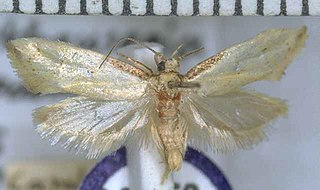
Cataclysta lemnata, the small china-mark, is a moth species of the family Crambidae. It is found in Europe, Morocco and Iran.
Holcopogon is a genus of gelechioid moths. It is the type genus of the subfamily Holcopogoninae, which is mostly placed within the concealer moth family Autostichidae.
Holcopogon bubulcellus is a moth of the family Autostichidae. It is found in southern Europe and North Africa.
Catacometes hemiscia is a moth in the family Oecophoridae. It was described by Edward Meyrick in 1883. It is found in Australia, where it has been recorded from New South Wales.
Garrha cholodella is a moth in the family Oecophoridae. It was described by Edward Meyrick in 1883. It is found in Australia, where it has been recorded from New South Wales.
Garrha leucerythra is a moth in the family Oecophoridae. It was described by Edward Meyrick in 1883. It is found in Australia, where it has been recorded from New South Wales and Tasmania.
Monochroa hornigi, the knotweed neb, is a moth of the family Gelechiidae. It was described by Otto Staudinger in 1883. It is found in most of Europe, European Russia, western and south-eastern Siberia, Transbaikalia, Korea and Japan (Hokkaido).
Holcopogon scaeocentra is a moth in the family Autostichidae. It was described by Edward Meyrick in 1921. It is found in Mozambique and South Africa.
Nephogenes melanoptila is a species of moth in the family Oecophoridae. It was described by Edward Meyrick in 1883. It is found in Australia, where it has been recorded from Queensland and New South Wales.
Eclecta is a monotypic moth genus in the family Depressariidae. Its only species, Eclecta aurorella, has been found in the Australian state of New South Wales. Both the genus and species were first described by Edward Meyrick in 1883.
Enchocrates glaucopis is a moth in the family Depressariidae. It was described by Edward Meyrick in 1883. It is found in Australia, where it has been recorded from the south-east of the country.
Cerconota tabida is a moth in the family Depressariidae. It was described by Arthur Gardiner Butler in 1877. It is found in the Brazilian states of Amazonas and Pará and in the Guianas.
Stenoma vapida is a moth in the family Depressariidae. It was described by Arthur Gardiner Butler in 1877. It is found in Brazil in the states of Pará and Amazonas.

Tingena apanthes is a species of moth in the family Oecophoridae. It is endemic to New Zealand and found in the North Island. The adults are on the wing from October to December. It appears associated with Leptospermum species and it has been hypothesised that the appearance of the adults of this species imitates faded Leptospermum leaves.

Tingena hemimochla is a species of moth in the family Oecophoridae. It is endemic to New Zealand and has been observed in the North Island. Adults of this species are on the wing from December until March.

Tingena letharga is a species of moth in the family Oecophoridae. It is endemic to New Zealand and has been observed in Otago. Adults are on the wing in December and January.

Tingena oxyina is a species of moth in the family Oecophoridae. It is endemic to New Zealand and has been observed in the Otago region. This species inhabits native beech forest at altitudes of between 1000 - 3000 ft. Adults of this species are on the wing in January.

Trachypepla lichenodes is a moth of the family Oecophoridae first described by Edward Meyrick in 1883. It is endemic to New Zealand and has been found in both the North and South Islands. It inhabits native forest and adults of this species are on the wing from November to January. The adult moths are similarly coloured to native lichen species however this colouration is variable in the extent and depth on the forewings.

Trachypepla photinella is a moth of the family Oecophoridae first described by Edward Meyrick in 1883. It is endemic to New Zealand and has been collected in Wellington, Wainuiomata, D'Urville Island and Christchurch. The preferred habitat of this species is native forest and adults are on the wing from December until February.

Trachypepla spartodeta is a moth of the family Oecophoridae first described by Edward Meyrick in 1883. It is endemic to New Zealand and has been collected in both the North and South Islands. This species inhabits native forest and adults are on the wing from November to January.







